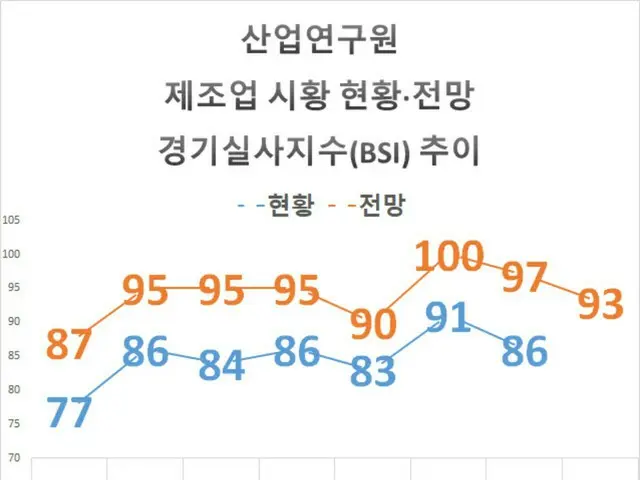The Korea Institute for Industrial Economics, a research institute run by the Korean government, conducted a third-party survey of 1,500 companies last month.
As a result of a survey on the current market conditions for the quarter and the outlook for the market in the fourth quarter, the market outlook economic index for the fourth quarter was 86, down 5 points from the outlook for the previous quarter of 91.
The Market Outlook Economic Survey Index is a numerical value between 0 and 200 based on the results of a questionnaire survey of companies, divided into positive and negative responses. The more negative responses there are, the lower the index is.
The more positive responses there are, the higher the index rises. The results of the fourth quarter market outlook economic survey index indicate that the number of companies with a pessimistic outlook for the manufacturing industry has increased.
At the time, the outlook for the second quarter remained neutral at 100, but the outlook for the third quarter at the time of the second quarter dropped to 97, and has now dropped again to 93.
During the same period, the sales outlook index (102, 98 to 95), the domestic market shipment outlook index (101, 96 to 94), and the export outlook index (1
Indicators other than market conditions are also trending downward, such as the index for semiconductors (92), displays (95), home appliances (90), and automobiles (94).
The BSI, which indicates market sentiment at the time of the survey, also fell compared to the previous quarter. The third quarter BSI was 86, down 5 points from the second quarter's 91.
The same trend was seen for most of the other indicators, including sales (from 94 to 87), shipments to the domestic market (from 92 to 86), and exports (from 99 to 90).
Companies that responded to the survey cited "the burden of production costs" as the biggest negative factor in their current business activities.
" (52%). This is lower than the 60% range in 2023, when the energy crisis was at its height, but more than half of the companies still cited this as a burden. Slowing demand and rising inventories
There was also a large increase in the number of companies that cited concerns about the supply chain (47%) and global supply chain issues (31%) as major concerns.
2024/10/16 07:11 KST
Copyrights(C) Edaily wowkorea.jp 107

